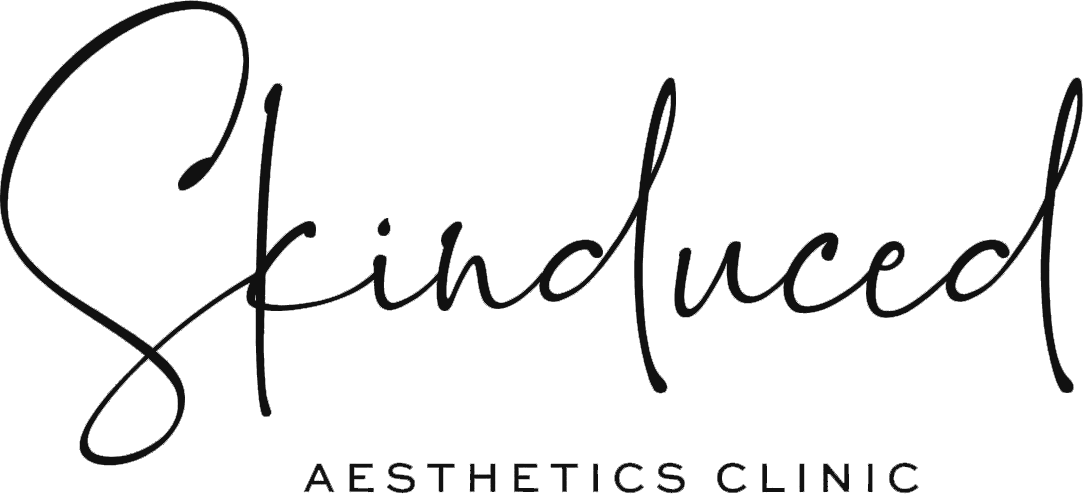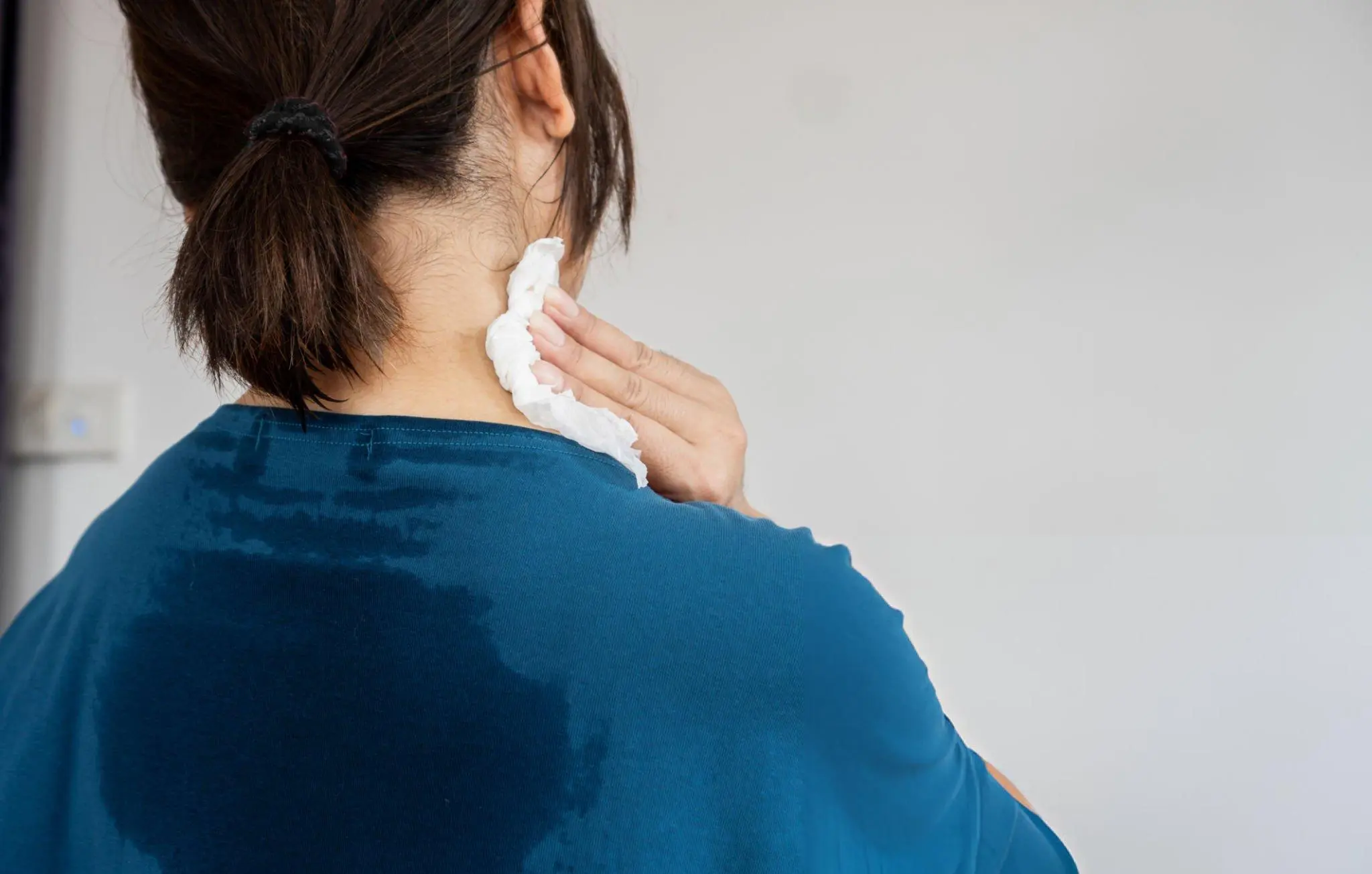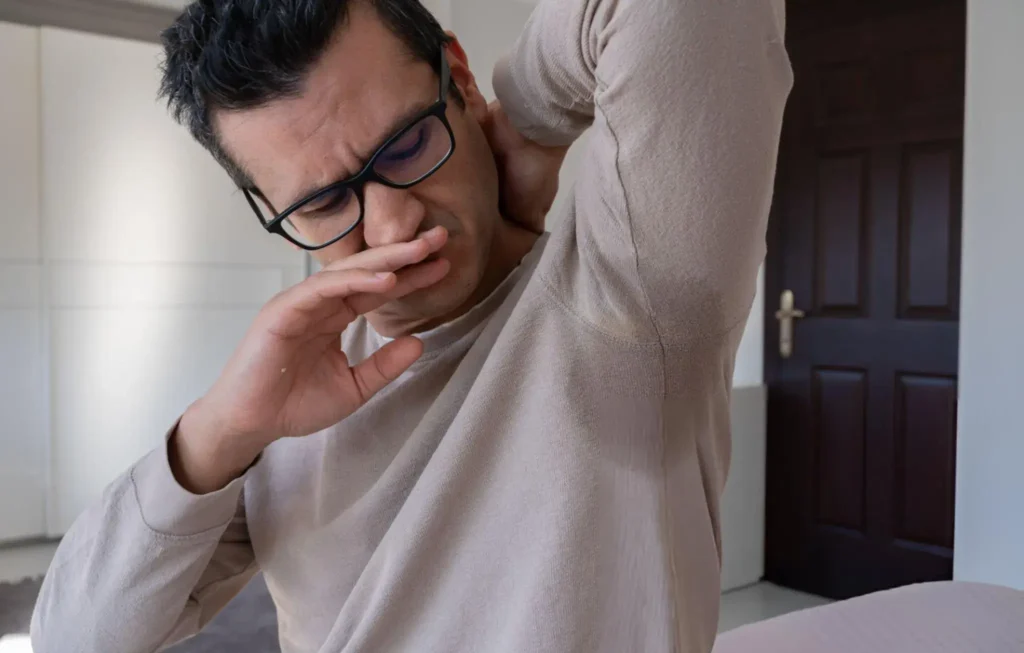What Is Hyperhidrosis Treatment? Symptoms, Causes, and When to See a Dermatologist
If spare shirts live in your bag and meetings mean stress about marks, you’re not alone. That handshake you avoid because your palms drip. The makeup that slides off your face in air conditioning. The shoes you can’t wear twice because of the smell.
This isn’t just “being a sweaty person.” These symptoms may be associated with hyperhidrosis, a condition involving overactive sweat glands that produce more sweat than the body requires. Hyperhidrosis treatment may help improve daily comfort and symptom management for some individuals.
When strong antiperspirants fail, a dermatologist can help. Hyperhidrosis treatment options may help reduce excessive sweating and its impact on daily activities.
If these symptoms are affecting your daily life, a consultation can help assess whether treatment is appropriate.
Book a Consultation to discuss hyperhidrosis symptoms and available management options.
Doctor-led care in Cameron Park. Treatment costs vary depending on the type of hyperhidrosis and management approach discussed. Benefits, risks, potential side effects, and expected outcomes are explained during consultation. Individual responses to treatment vary.
What Is Hyperhidrosis?
Hyperhidrosis means your sweat glands work overtime. Your body produces significantly more sweat than is required for temperature regulation, even when you’re cool and relaxed.
This medical condition affects millions of people worldwide. You sweat excessively on specific body parts, usually your underarms, palms, face, or feet.
Two main types exist:
Primary hyperhidrosis starts in childhood or the teens. Your sweat glands just work too hard for no medical reason. This affects your hands, feet, underarms, or face.
Secondary hyperhidrosis happens because of another medical condition or medication. This type can affect your whole body and often starts in adulthood.
Most people who seek hyperhidrosis treatment have primary hyperhidrosis. Your excessive sweating isn’t caused by anxiety, heat, or poor hygiene. Your sweat glands simply produce too much. Treatment approaches aim to manage overactive sweat glands in suitable individuals.
Also Read: https://skinduced.com.au/your-prp-aftercare-guide/
Do You Have Hyperhidrosis? Check These Signs
You may wish to seek assessment for hyperhidrosis if you experience:
- You sweat through shirts in air conditioning
- Your palms drip before meetings or exams
- Makeup runs off indoors on normal days
- You change clothes multiple times daily
- Deodorant and clinical antiperspirants don’t work
- You avoid handshakes or touching surfaces
- Your feet smell even with good hygiene
- Sweat stains ruin your clothes regularly
- You plan outfits around hiding sweat marks
The sweating happens even when you’re calm and cool. Heat and stress make it worse, but they don’t cause it.
Types of Hyperhidrosis and Where It Affects You
Underarm Hyperhidrosis (Axillary)
This affects your underarms and causes the most social problems. You soak through shirts, deal with constant body odor, and worry about raising your arms.
People with underarm hyperhidrosis often struggle daily until they find proper hyperhidrosis treatment:
- Keep spare shirts at work
- Wear only dark colors or patterns
- Avoid certain fabrics that show stains
- Feel stressed in professional settings
Modern hyperhidrosis treatment may help reduce these concerns and improve daily comfort for some individuals.
Sweaty Hands (Palmar Hyperhidrosis)
Your palms stay wet and slippery until you get proper hyperhidrosis treatment. This creates problems with:
- Handshakes at work or social events
- Using phones, tablets, or computer mice
- Writing exams or taking notes
- Playing musical instruments
- Any job requiring a good grip
Professional hyperhidrosis treatment may help reduce excessive palm sweating and its impact on daily activities.
Face and Head Sweating (Cranial/Facial)
Sweat beads on your forehead, face, or scalp in normal temperatures. This causes:
- Makeup that won’t stay put
- Hair that looks greasy quickly
- Sweat dripping into your eyes
- Embarrassment in social situations
Foot Hyperhidrosis (Plantar)
Your feet stay wet inside shoes, creating:
- Strong foot odor even with good hygiene
- Shoes that wear out quickly
- Slipping inside shoes
- Skin problems between toes
- Avoiding situations where you remove your shoes
What Causes Excessive Sweating?
Primary Hyperhidrosis Causes
Scientists don’t know exactly why some people develop overactive sweat glands. Research shows:
- Genetics plays a role, it often runs in families
- Nerve signals go wrong, your nervous system tells sweat glands to work too hard
- It is not related to hygiene or personal control
Secondary Hyperhidrosis Triggers
This type happens because of:
Medical conditions:
- Diabetes and blood sugar problems
- Thyroid disorders (overactive thyroid)
- Heart disease or high blood pressure
- Menopause and hormone changes
- Infections that cause fever
- Certain underlying medical conditions, including some cancers
Medications that cause sweating:
- Antidepressants
- Blood pressure medications
- Diabetes medications
- Some pain medications
- Hormone treatments
When to See a Dermatologist
Most people try drugstore antiperspirants first before seeking professional hyperhidrosis treatment. You should see a specialist when:
- Clinical-strength antiperspirants don’t work after 2-3 months
- Sweating blocks your daily activities
- You avoid social or work situations because of sweat
- Your skin gets irritated from constant moisture
- Home remedies and lifestyle changes don’t help
A dermatologist can provide proper hyperhidrosis treatment after determining if you have primary or secondary hyperhidrosis. They’ll check if medications or medical conditions cause your sweating before starting any hyperhidrosis treatment plan.
A consultation can help assess symptoms and discuss appropriate management options. Treatment costs vary depending on the approach recommended. Individual responses to treatment vary.
Treatment Options for Hyperhidrosis
Prescription Antiperspirants
Stronger than drugstore versions, these prescription options represent the first line of professional hyperhidrosis treatment. They contain aluminum chloride, and you apply them at bedtime on completely dry skin.
How they work: They plug your sweat ducts temporarily.
Best for: Underarms, hands, feet
Results: Some individuals notice improvement within 1–2 weeks with consistent use consistent hyperhidrosis treatment
Side effects: Skin irritation, itching, stinging
Botox Injections for Hyperhidrosis
Botox blocks the nerve signals that trigger sweating. This treatment is commonly used for managing excessive sweating works exceptionally well for underarms and palms.
The process:
- Multiple small injections in the affected area
- Takes 15-30 minutes
- Some individuals notice effects within several days
- Effects may last several months, though duration varies
Some individuals report reduced sweating and improved daily comfort.
Side effects include: Temporary weakness in hands (for palm hyperhidrosis treatment), injection site pain, and minor bruising
Oral Medications
Anti-cholinergic drugs reduce sweating throughout your body. Doctors prescribe glycopyrrolate or oxybutynin.
Benefits: Can help with whole-body sweating
Side effects may include dry mouth, constipation, blurred vision, or dizziness
Best for: People with widespread sweating who can’t use topical treatments
Advanced Treatment Options
Iontophoresis: Uses a mild electrical current through water to reduce hand and foot sweating. You do this at home with a special device.
Endoscopic thoracic sympathectomy: A surgical procedure that interrupts specific nerve pathways. This option is typically reserved for severe cases due to the risk of compensatory sweating. Doctors only recommend this for severe cases because of compensatory sweating – increased sweating in other body areas. Outcomes and risks vary between individuals.
Sweat gland removal: Surgical removal of sweat glands in the underarms. This permanent solution has risks, including scarring and infection.
What to Expect During Treatment
Your First Appointment
Your dermatologist will:
- Ask about your sweating patterns and triggers
- Check which body areas are affected
- Review your medical history and current medications
- Examine your skin for irritation or other problems
- Discuss treatment options that fit your lifestyle
Treatment Timeline
Week 0: Consult and create your treatment plan
Week 1–2: Some individuals may begin noticing changes in sweating patterns
Month 1: Follow-up appointment to review response and adjust treatment if required
Monthly: Regular reviews to maintain results
Results vary between people. Your dermatologist will discuss realistic expectations, potential risks, and side effects before starting any hyperhidrosis treatment. This comprehensive hyperhidrosis treatment approach ensures you understand exactly what to expect from your specific therapy plan.
Living with Hyperhidrosis: Practical Tips
While you explore medical hyperhidrosis treatment, these strategies help manage daily challenges:
Clothing Choices
- Choose natural fabrics like cotton and linen
- Wear loose-fitting clothes when possible
- Keep dark colors and busy patterns in your wardrobe
- Use dress shields or undershirts for extra protection
Daily Management
- Shower daily with antibacterial soap
- Change clothes when they get damp
- Use powder to absorb moisture
- Carry wet wipes for quick cleanup
Professional Situations
- Keep a spare shirt at work
- Use a small towel for discreet wiping
- Schedule important meetings during cooler times
- Practice handshake alternatives like fist bumps
Cost and Insurance Coverage
Hyperhidrosis treatment costs vary by method:
Prescription antiperspirants: $30-100 per tube
Botox injections: Cost varies depending on the treatment area and clinical assessment
Oral medications: $20-50 monthly
Iontophoresis devices: $500-800 upfront
Some private health funds cover medical hyperhidrosis treatment. Medicare may provide rebates for eligible consultations. Most procedural treatments are not covered.
Your dermatologist will explain the exact costs and payment options for your specific hyperhidrosis treatment during consultation.
Risks and Side Effects to Consider
Every hyperhidrosis treatment has potential side effects:
Topical treatments: Skin irritation, burning sensation, contact dermatitis
Botox injections: Temporary muscle weakness, injection site pain, rare allergic reactions
Oral medications: Dry mouth, constipation, drowsiness, difficulty urinating
Surgery: Infection, scarring, compensatory sweating, nerve damage
Your doctor will explain these risks and help you choose the safest, most effective hyperhidrosis treatment for your situation.
When Treatment Doesn’t Work
Sometimes, first treatments don’t give enough relief. Your options include:
- Trying a different medication or strength
- Combining treatments (like topical plus oral)
- Switching to a different approach entirely
- Considering more intensive treatments
Don’t give up if your first treatment doesn’t work perfectly. Hyperhidrosis management often takes time to find the right solution.
Special Considerations for Different Areas
Treating Underarm Hyperhidrosis
This responds well to Botox and prescription antiperspirants. Many individuals notice improvement over the first few weeks, though response varies.
Avoid shaving right before treatment applications. This can increase skin irritation.
Hand Hyperhidrosis Treatment
Palmar treatment needs special care. Botox injections can temporarily weaken hand muscles, affecting grip strength.
Iontophoresis works well for hands and feet without systemic side effects.
Facial Sweating Solutions
Face treatments require extra precision. Your dermatologist will use smaller amounts of Botox to avoid affecting facial expressions.
Prescription antiperspirants aren’t suitable for facial use due to skin sensitivity.
Finding the Right Dermatologist
Choose a dermatologist who:
- Has experience treating hyperhidrosis specifically
- Offers multiple treatment options
- Explains risks and benefits clearly
- Provides realistic timelines and expectations
- Follows up regularly to monitor results
Look for someone who understands how excessive sweating affects your daily life, not just the medical aspects.
Take Control of Your Sweating
Hyperhidrosis can significantly affect daily comfort and confidence.
Medical assessment helps determine whether treatment may reduce symptoms and improve quality of life.
A consultation allows discussion of suitable options, potential benefits, risks, and expected outcomes based on individual needs.
Doctor-led hyperhidrosis consultations are available in Cameron Park. Treatment suitability, costs, and outcomes vary and are explained prior to commencement.
FAQ’s:
How long does hyperhidrosis treatment take to work?
This depends on which hyperhidrosis treatment you choose. Prescription antiperspirants show results in 1-2 weeks. Botox injections may begin to take effect within several days, with duration varying between individuals. Oral medications may take several weeks to show noticeable effects.
Is hyperhidrosis treatment painful?
Most hyperhidrosis treatment options cause minimal discomfort. Topical treatments might cause skin irritation initially. Botox injections may cause temporary discomfort at injection sites and take 15-30 minutes. Your dermatologist can use numbing cream to reduce any discomfort.
Will my insurance cover hyperhidrosis treatment?
Some private health funds cover medical hyperhidrosis treatment when it’s deemed medically necessary. Medicare typically covers consultation costs but may not cover all treatment options. We’ll help you understand your coverage options during your visit.
Can I stop hyperhidrosis treatment once it starts working?
This varies by treatment type. Prescription antiperspirants need ongoing use to maintain results. Botox effects wear off after 4-6 months, requiring repeat treatments. Oral medications work only while you’re taking them. Your doctor will explain maintenance requirements for your specific hyperhidrosis treatment.
What happens if the first hyperhidrosis treatment doesn’t work?
Many people need to try different approaches before finding their ideal hyperhidrosis treatment. Your dermatologist might adjust dosages, switch medications, or combine treatments. Don’t give up – effective hyperhidrosis treatment exists for almost everyone.
Are there any foods I should avoid during hyperhidrosis treatment?
Spicy foods, caffeine, and alcohol can trigger more sweating in some people. While undergoing hyperhidrosis treatment, you should notice which foods make your symptoms worse and limit them accordingly.
Can teenagers get hyperhidrosis treatment?
Yes, hyperhidrosis often starts in childhood or teenage years. Many hyperhidrosis treatment options are safe for teens, but the approach might differ from adult treatments. A dermatologist can recommend age-appropriate options.



